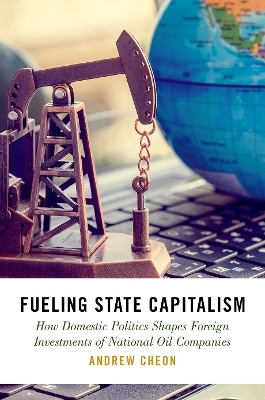
Fueling State Capitalism
Oxford University Press Inc (Verlag)
978-0-19-767288-4 (ISBN)
Using principal agent theory, Cheon shows that competition among NOCs' principals at two different levels of government--national and bureaucratic--conditions the foreign investments of NOCs. While competition between the chief executive and opposition parties can limit democratic governments' capacity to tolerate failed investments abroad, non-democratic governments are less constrained. An overlap of authority among bureaucratic institutions can also encourage counterproductive behavior among NOCs, whereas a clear line of authority among them can prevent it.
Looking at investments from 79 countries from 2000 to 2013, as well as case studies of China, India, Brazil, Norway, and Russia, Fueling State Capitalism unpacks the role of institutions, both national and bureaucratic, in shaping the global expansion of national energy firms. Moreover, Cheon probes the energy security motivations of NOC investments and the origins of bureaucratic structures. Based on the experience of NOC global expansion, Cheon concludes that bureaucratic institutions will be critical in achieving decarbonization that not only allows governments to meet their political objectives, but also helps NOCs ensure their long-term commercial viability through a managed transition to renewable energy.
Andrew Cheon is Assistant Professor of International Political Economy at Johns Hopkins SAIS. His research covers state capitalism, rising powers, coercive diplomacy, energy security, and environmental conflict. He was previously the founding President of Duke East Asia Nexus, an academic journal. His work appears in outlets such as Economics and Politics, Comparative Political Studies, Journal of Conflict Resolution, Political Studies, Global Environmental Change, and Energy Policy. He is also co-author of Activism and the Fossil Fuel Industry.
1. Introduction
2. The Baseline: Political and Economic Drivers
3. Domestic Structure and NOC Global Expansion
4. Do Institutions Matter? A Quantitative Analysis
5. Bureaucratic Competition in China and India
6. Designated Principals in Brazil and Norway
7. The Complicated Case of Russia
8. Professionalization as an Alternative Explanation
9. Conclusion and Implications
| Erscheinungsdatum | 17.03.2023 |
|---|---|
| Reihe/Serie | STUDIES COMPAR ENERGY ENVIRON POL SERIES |
| Verlagsort | New York |
| Sprache | englisch |
| Maße | 239 x 162 mm |
| Gewicht | 435 g |
| Themenwelt | Naturwissenschaften ► Biologie ► Ökologie / Naturschutz |
| Sozialwissenschaften ► Politik / Verwaltung ► Vergleichende Politikwissenschaften | |
| Wirtschaft ► Volkswirtschaftslehre ► Wirtschaftspolitik | |
| ISBN-10 | 0-19-767288-4 / 0197672884 |
| ISBN-13 | 978-0-19-767288-4 / 9780197672884 |
| Zustand | Neuware |
| Informationen gemäß Produktsicherheitsverordnung (GPSR) | |
| Haben Sie eine Frage zum Produkt? |
aus dem Bereich


